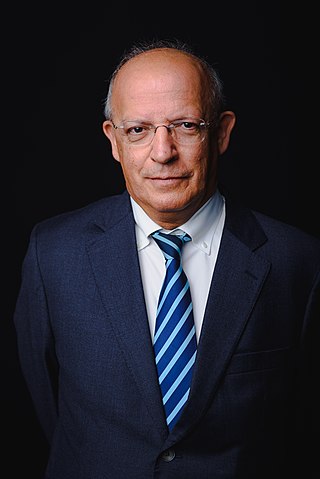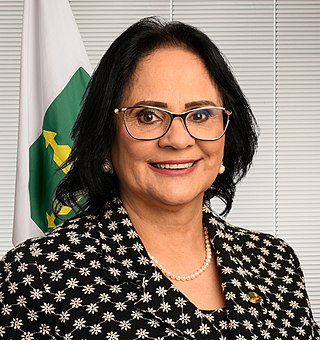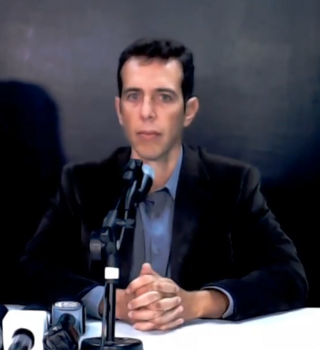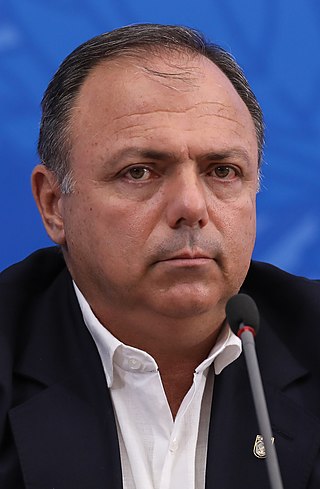
Marcos Cesar Pontes is a Brazilian Air Force pilot, engineer, AEB astronaut, politician and author. He became the first South American and the first Lusophone to go into space when he docked onto the International Space Station aboard Soyuz TMA-8 on 30 March 2006. He is the only Brazilian to have completed the NASA astronaut training program, although he switched to training in Russia after NASA's Space Shuttle program encountered problems. After Jair Bolsonaro's election as President of Brazil in 2018, Pontes was officially nominated to be Minister of Science, Technology and Innovation, a post which he accepted days later and assumed when Bolsonaro's government began. He left the post on 31 March 2022 and in the same year was elected federal senator for his state, São Paulo.

Fernando Haddad is a Brazilian scholar, lawyer and politician who has served as the Brazilian Minister of Finance since 1 January 2023. He was previously the mayor of São Paulo from 2013 to 2017 and the Brazilian minister of education from 2005 to 2012.

Sergio Fernando Moro is a Brazilian jurist, former federal judge, college professor, and politician. He was elected as a member of the Federal Senate for Paraná in October 2022. In 2015, he gained national attention as one of the lead judges in Operation Car Wash, a criminal investigation into a high-profile corruption and bribery scandal involving government officials and business executives. Moro was also Minister of Justice and Public Security under the presidency of Jair Bolsonaro from 2019 to 2020.

Augusto Ernesto dos Santos Silva is a Portuguese sociologist, university professor, and politician who served as the President of the Assembly of the Republic between 2022 and 2024, in the 15th Legislature. From November 2015 to March 2022, he was the Portuguese Minister of Foreign Affairs, in the XXI and XXII Constitutional Governments led by Prime Minister António Costa.

Onyx Dornelles Lorenzoni is a Brazilian politician, businessman, and veterinarian. A member of the Liberal Party (PL), he served as a federal deputy from Rio Grande do Sul for five terms. After the 2018 Brazilian general election, the president-elect Jair Bolsonaro invited Lorenzoni to be his Chief of Staff. He was also designated leader of the transition team.

Ricardo Vélez Rodríguez is a Colombian-Brazilian philosopher and former Minister of Education of Brazil.

Damares Regina Alves is a Brazilian lawyer and evangelical pastor.

Abraham Bragança de Vasconcellos Weintraub is a Brazilian economist and investment banker who served as Brazil's Minister of Education from 2019 to 2020. He served as the Executive Director for the World Bank from the 15th district from 2020 to 2022, when he resigned his post in order to run in the 2022 São Paulo gubernatorial election.

Luiz Eduardo Ramos Baptista Pereira is a Brazilian Army four-star General, who was the Secretary of Government for President Jair Bolsonaro, succeeding Lieutenant General Carlos Alberto dos Santos Cruz.

Events in the year 2020 in Brazil.

André Luiz de Almeida Mendonça is a Brazilian attorney, Presbyterian pastor, and politician currently serving as Justice of the Supreme Federal Court. He is the third evangelical Christian positioned to join the top court, and former Minister of Justice and Public Security and Attorney General of the Union in the administration of President Jair Bolsonaro. Prior to assuming this role, he served as Attorney General of Brazil in the same administration.

Gustavo Henrique Rigodanzo Canuto is a Brazilian engineer and politician, former Minister of Regional Development.

Nelson Luiz Sperle Teich is a Brazilian oncologist, health consultant and entrepreneur who briefly served as Minister of Health of Brazil, from 17 April 2020 after being appointed by President Jair Bolsonaro to replace outgoing Minister Luiz Henrique Mandetta, to his resignation on 15 May 2020 after nearly a month at the helm.

Renato Feder is a Brazilian economist, entrepreneur, politician and professor. He has been serving as the State Secretary of Education of São Paulo since January 2023 and had served as Secretary of Education of Paraná from 2019 to 2023. Feder is also a partner at the Brazilian electronics and computing company, Multilaser.

Milton Ribeiro is a Brazilian protestant pastor, lawyer, theologian, professor and former Minister of Education of Brazil.

Eduardo Pazuello is a Brazilian divisional general of the Brazilian Army and politician, he served as Minister of Health between 2020 and 2021.

Carlos Alberto Franco França is a Brazilian diplomat who served as Brazil's Minister of Foreign Affairs from 2021 to 2022. He was appointed by President Jair Bolsonaro on 29 March 2021 to replace outgoing Minister Ernesto Araújo.

Anderson Gustavo Torres is a Brazilian chief of police of the Federal Police, who served as Minister of Justice and Public Security under Jair Bolsonaro. Following the 2023 invasion of the Brazilian Congress, Torres' arrest was ordered by the Supreme Federal Court.

A military crisis was triggered in March 2021 when Brazil's highest military officials resigned in response to President Jair Bolsonaro's attempts to politicize the armed forces. Since the beginning of his government, Bolsonaro had appointed an unprecedented number of military personnel to civilian positions, seeking to receive, in exchange, support from the military, including through public demonstrations in favor of his government's policies and against the measures adopted by the governors to confront the COVID-19 pandemic, in addition to advocating the decree of the State of Defense, as a way to increase its powers.

The presidential transition of Luiz Inácio Lula da Silva's second presidency officially began on November 3, 2022, and ended with his inauguration on January 1, 2023. Then vice president-elect Geraldo Alckmin was appointed as the chair of Lula's transition team on November 1, 2022.




















